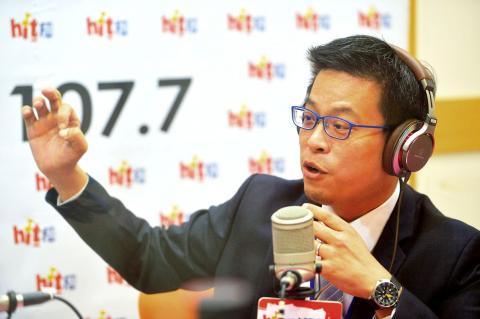The government has a strategy in place for if Taiwan were to lose all of its diplomatic allies, Presidential Office spokesman Alex Huang (黃重諺) said yesterday, but added that the nation would not succumb to China’s mounting pressure.
During a morning interview with radio show host Clara Chou (周玉蔻), Huang was asked whether President Tsai Ing-wen’s (蔡英文) administration has contemplated the possibility of being left with no diplomatic allies after losing El Salvador on Tuesday.
El Salvador is the fifth nation to switch official recognition to Beijing since Tsai took office in May 2016, following Sao Tome and Principe, Panama, the Dominican Republic and Burkina Faso, leaving the nation with 17 diplomatic allies.

Photo: CNA
“We have considered all kinds of scenarios and I think [the one you mentioned] was among them,” Huang said, but declined to reveal Tsai’s bottom line in terms of the number of allies.
Tsai’s national security team months ago received intelligence concerning El Salvador’s possible switch, which was why it examined all possible scenarios and prepared corresponding measures before Tsai embarked on her nine-day visit to Paraguay and Belize on Aug. 12, Huang added.
“They explored five or six hypothetical scenarios, including [the breakage of ties occurring] before Tsai’s visit, during her transit stops in the US, during her stay at our diplomatic allies and after her return,” he said.
Regarding the controversy surrounding Taiwan-based bakery cafe 85°C (85度C) — which declared its support for the so-called “1992 consensus” amid boycott threats from China after a store in Los Angeles served Tsai — Huang said that Tsai’s visit to the store was arranged in advance.
Tsai only visited to offer encouragement to a Taiwanese business, Huang said, adding that she found China’s reaction incredible.
Asked whether the incident would prevent Tsai from visiting overseas Taiwanese businesses, Huang said: “Some US-based Taiwanese businesspeople have actually invited the president to visit their companies in her future transit stops as a show of support.”
Tsai has never considered succumbing to Beijing’s threats, because of incidents such as China barring a choir from Nantou County’s Minhe Junior High School from performing at the World Peace Choral Festival in Vienna last month, Huang said.
“We want to make sure that our next generations are able to freely represent themselves,” he said.
The “1992 consensus” refers to a tacit understanding between the Chinese Nationalist Party (KMT) and the Chinese Communist Party that both sides of the Taiwan Strait acknowledge there is “one China,” with each side having its own interpretation of what “China” means.

Tropical Storm Gaemi strengthened into a typhoon at 2pm yesterday, and could make landfall in Yilan County tomorrow, the Central Weather Administration (CWA) said yesterday. The agency was scheduled to issue a sea warning at 11:30pm yesterday, and could issue a land warning later today. Gaemi was moving north-northwest at 4kph, carrying maximum sustained winds near its center of up to 118.8kph and gusts of 154.8kph. The circumference is forecast to reach eastern Taiwan tomorrow morning, with the center making landfall in Yilan County later that night before departing from the north coast, CWA weather forecaster Kuan Shin-ping (官欣平) said yesterday. Uncertainty remains and

SEA WARNING LIKELY: The storm, named Gaemi, could become a moderate typhoon on Wednesday or Thursday, with the Taipei City Government preparing for flooding A tropical depression east of the Philippines developed into a tropical storm named Gaemi at 2pm yesterday, and was moving toward eastern Taiwan, the Central Weather Administration (CWA) said. Gaemi could begin to affect Taiwan proper on Tuesday, lasting until Friday, and could develop into a moderate typhoon on Wednesday or Thursday, it said. A sea warning for Gaemi could be issued as early as Tuesday morning, it added. Gaemi, the third tropical storm in the Pacific Ocean this typhoon season, is projected to begin moving northwest today, and be closest to Taiwan on Wednesday or Thursday, the agency said. Today, there would likely

DISRUPTIONS: The high-speed rail is to operate as normal, while several airlines either canceled flights or announced early departures or late arrivals Schools and offices in 15 cities and counties are to be closed today due to Typhoon Gaemi, local governments announced last night. The 15 are: Taipei, New Taipei City, Taoyuan, Tainan, Keelung, Hsinchu and Kaohsiung, as well as Yilan, Hualien, Hsinchu, Miaoli, Chiayi, Pingtung, Penghu and Lienchiang counties. People should brace for torrential rainfall brought by the storm, with its center forecast to make landfall on the east coast between tonight and tomorrow morning, the Central Weather Administration (CWA) said. The agency issued a sea warning for the typhoon at 11:30pm on Monday, followed by a land warning at 11:30am yesterday. As of

CASUALTY: A 70-year-old woman was killed by a falling tree in Kaohsiung as the premier warned all government agencies to remain on high alert for the next 24 hours Schools and offices nationwide are to be closed for a second day today as Typhoon Gaemi crosses over the nation, bringing torrential rain and whipping winds. Gaemi was forecast to make landfall late last night. From Tuesday night, its outer band brought substantial rainfall and strong winds to the nation. As of 6:15pm last night, the typhoon’s center was 20km southeast of Hualien County, Central Weather Administration (CWA) data showed. It was moving at 19kph and had a radius of 250km. As of 3pm yesterday, one woman had died, while 58 people were injured, the Central Emergency Operation Center said. The 70-year-old